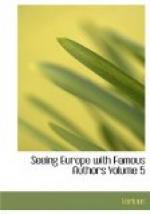Strauss seemed to feel the music in every limb. He would wave his fiddle-bow a while, then commence playing with desperate energy, moving his whole body to the measure, till the sweat rolled from his brow. A book was lying on the stand before him, but he made no use of it. He often glanced around with a kind of half-triumphant smile at the restless crowd, whose feet could scarcely be restrained from bounding to the magic measure. It was the horn of Oberon realized. The composition of the music displayed great talent, but its charm consisted more in the exquisite combination of the different instruments, and the perfect, the wonderful, exactness with which each performed its part—a piece of art of the most elaborate and refined character.
The company, which consisted of several hundred, appeared to be full of enjoyment. They sat under the trees in the calm, cool twilight with the stars twinkling above, and talked and laughed sociably together between the pauses of the music, or strolled up and down the lighted alleys. We walked up and down with them, and thought how much we should enjoy such a scene at home, where the faces around us would be those of friends and the language our mother-tongue.
We went a long way through the suburbs one bright afternoon to a little cemetery about a mile from the city to find the grave of Beethoven. On ringing at the gate a girl admitted us into the grounds, in which are many monuments of noble families who have vaults there. I passed up the narrow walk, reading the inscriptions, till I came to the tomb of Franz Clement, a young composer who died two or three years ago. On turning again my eye fell instantly on the word “Beethoven” in golden letters on a tombstone of gray marble. A simple gilded lyre decorated the pedestal, above which was a serpent encircling a butterfly—the emblem of resurrection. Here, then, moldered the remains of that restless spirit who seemed to have strayed to earth from another clime, from such a height did he draw his glorious conceptions.
The perfection he sought for here in vain he has now attained in a world where the soul is freed from the bars which bind it in this. There were no flowers planted around the tomb by those who revered his genius; only one wreath, withered and dead, lay among the grass, as if left long ago by some solitary pilgrim, and a few wild buttercups hung with their bright blossoms over the slab. It might have been wrong, but I could not resist the temptation to steal one or two while the old gravedigger was busy preparing a new tenement. I thought that other buds would open in a few days, but those I took would be treasured many a year as sacred relics. A few paces off is the grave of Schubert, the composer whose beautiful songs are heard all over Germany.




